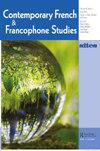“Comment devient-on une écrivaine?”: Pineau, Kanor, Octavia
IF 0.2
4区 文学
0 LITERATURE, ROMANCE
引用次数: 0
Abstract
This article examines Gisèle Pineau’s Fleur de Barbarie (2007), Fabienne Kanor’s Je ne suis pas un homme qui pleure (2016) and Gaël Octavia’s La Bonne Histoire de Madeleine Démétrius (2020). Striki..."如何成为作家?皮诺、卡诺尔、奥克塔维亚
本文探讨了 Gisèle Pineau 的《Fleur de Barbarie》(2007 年)、Fabienne Kanor 的《Je ne suis pas un homme qui pleure》(2016 年)和 Gaël Octavia 的《La Bonne Histoire de Madeleine Démétrius》(2020 年)。令人震惊的是
本文章由计算机程序翻译,如有差异,请以英文原文为准。
求助全文
约1分钟内获得全文
求助全文
来源期刊

Contemporary French and Francophone Studies
LITERATURE, ROMANCE-
CiteScore
0.30
自引率
0.00%
发文量
43
期刊介绍:
An established journal of reference inviting all critical approaches on the latest debates and issues in the field, Contemporary French & Francophone Studies (formerly known as SITES) provides a forum not only for academics, but for novelists, poets, artists, journalists, and filmmakers as well. In addition to its focus on French and Francophone studies, one of the journal"s primary objectives is to reflect the interdisciplinary direction taken by the field and by the humanities and the arts in general. CF&FS is published five times per year, with four issues devoted to particular themes, and a fifth issue, “The Open Issue” welcoming non-thematic contributions.
 求助内容:
求助内容: 应助结果提醒方式:
应助结果提醒方式:


